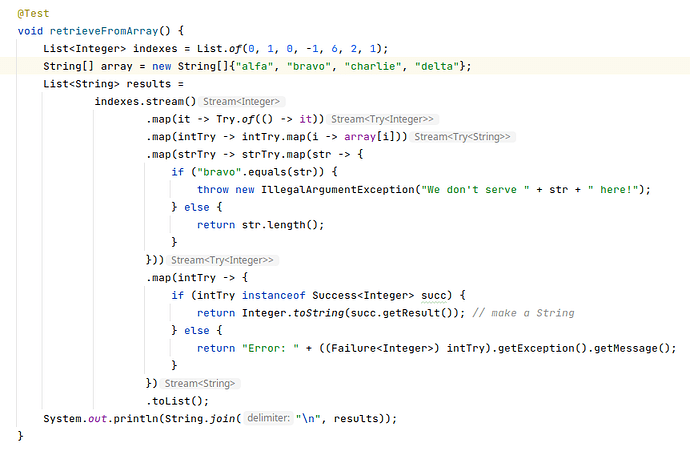It turns out that Try<T> can be ameliorated by judicious application of subclassing: no need to distinguish by actual type in the subclass inside an overridden method, the subclass knows what it is and it doesn need the overridden method at all.
Here we go, I have packed the three classes into a common “module” class called Exceptional but this can of course be dropped with no effect.
A more particular changes is that we only carre Exception not Throwable. Carrying (and catching in the stream pipeline of) Throwable is too much! We do not want to catch OutOfMemoryError. We should NOT catch anything in the Error sub-hierarchy, only Exception, which includes unchecked and checked exceptions, but more importantly those are the exceptions we can do something about.
The type variables have been renamed for clarity:
- OUT is in type of the output of the “code” function.
- HELD is the type of the successfully computed output of the “code” function (so the same as OUT)
- NEXT is the type of output of “mapper” function.
The comments include further notes.
I will post these along with example code, but a skeleton example has been added.
import java.util.concurrent.Callable;
import java.util.function.Function;
public abstract class Exceptional {
// Modified "exceptionhandling/fpij/Try.java" on page 175
public sealed interface Try<HELD> permits Success, Failure {
static <OUT> Try<OUT> of(Callable<OUT> code) {
try {
return new Success<>(code.call());
} catch(Exception ex) {
return new Failure<>(ex);
}
}
<NEXT> Try<NEXT> map(Function<HELD, NEXT> mapper);
}
// Modified "exceptionhandling/fpij/Success.java" on page 176
static final class Success<HELD> implements Try<HELD> {
private final HELD result;
public Success(HELD result) { this.result = result; }
public HELD getResult() { return result; }
@Override
public <NEXT> Try<NEXT> map(Function<HELD, NEXT> mapper) {
return Try.of(() -> mapper.apply(getResult()));
}
}
// Modified "exceptionhandling/fpij/Failure.java" on 176
static final class Failure<HELD> implements Try<HELD> {
private final Exception ex;
public Failure(Exception ex) { this.ex = ex; }
public Exception getException() { return ex; }
// Note that the parametrized type changes here!!
// Failure<HELD>.map(HELD->NEXT) returns Failure<NEXT>.
// So we cannot just return "this", even though in
// the compiled and type-erased code, it would make no difference.
@Override
public <NEXT> Try<NEXT> map(Function<HELD, NEXT> mapper) {
return new Failure<NEXT>(ex);
}
}
}
As an application as JUnit test, getting the airport names:
Note that the “pattern matching switch” is still “preview” in Java 18 (I actually thought it been released in Java 17? Apparently not!). However, “Java 18” is supposed to be the “Java of the book”, so can we really use it?
// Airports to retrieve. "IHA" is an invalid code, so gives rise to an error during fetch.
private final List<String> iataCodes = List.of("AUS", "DFW", "HOU", "IHA", "SAT");
@Test
void retrieveMultipleAirportNames_streamPipelineMonadicAccordingToBook() {
final List<String> results =
iataCodes.stream()
.map(iataCode -> Try.of(() -> getNameOfAirport(iataCode)))
.map(nameTry -> nameTry.map(String::toUpperCase))
.map(nameTry -> {
if (nameTry instanceof Success<String> succ) {
return succ.getResult();
} else {
return "Error: " + ((Failure<String>) nameTry).getException().getMessage();
}
})
.toList();
System.out.println(String.join("\n", results));
}
}
Another application, where we switch the type from Integer to String, and back to Integer. More fun than above. For symmetry reasons, we immediately switch to a Stream<Try<Integer>> without doing anything at the very start of the pipline.
// An example using "Try" which changes the carried type from Integer to String to Integer
// and has two places in the stream where exceptions can be thrown.
// 4
// Error: We don't serve bravo here!
// 4
// Error: Index -1 out of bounds for length 4
// Error: Index 6 out of bounds for length 4
// 7
// Error: We don't serve bravo here!
@Test
void retrieveFromArray() {
final List<Integer> indexes = List.of(0, 1, 0, -1, 6, 2, 1);
final String[] array = new String[]{"alfa", "bravo", "charlie", "delta"};
final List<String> results =
indexes.stream()
.map(it -> Try.of(() -> it))
.map(intTry -> intTry.map(i -> array[i]))
.map(strTry -> strTry.map(str -> {
if ("bravo".equals(str)) {
throw new IllegalArgumentException("We don't serve " + str + " here!");
} else {
return str.length();
}
}))
.map(intTry -> {
if (intTry instanceof Success<Integer> succ) {
return Integer.toString(succ.getResult()); // make a String
} else {
return "Error: " + ((Failure<Integer>) intTry).getException().getMessage();
}
})
.toList();
System.out.println(String.join("\n", results));
}
The IDE (here IntelliJ IDEA) is extremely helpful in showing the stream types. Text-only editors are no longer adequate…
If we want to break off at the first occurrence of an exception (but we lose information about the exception here)
@Test
void retrieveFromArrayBreakOffAtFirstException() {
final List<Integer> indexes = List.of(0, 1, 0, -1, 6, 2, 1);
final String[] array = new String[]{"alfa", "bravo", "charlie", "delta"};
final List<String> results =
indexes.stream()
.map(it -> Try.of(() -> it))
.map(intTry -> intTry.map(i -> array[i]))
.takeWhile(xTry -> xTry instanceof Success<?>)
.map(strTry -> ((Success<String>) strTry).getResult()) // make a String
.toList();
System.out.println(String.join("\n", results));
}
If we want to break off AND retain the exception, it seems easiest to squirrel it away into a “global variable” stash.
@Test
void retrieveFromArrayBreakOffAtFirstExceptionButKeepException() {
final List<Exception> stash = Collections.synchronizedList(new ArrayList<>(1));
final List<Integer> indexes = List.of(0, 1, 0, -1, 6, 2, 1);
final String[] array = new String[]{"alfa", "bravo", "charlie", "delta"};
final List<String> results =
indexes.stream()
.map(it -> Try.of(() -> it))
.map(intTry -> intTry.map(i -> array[i]))
.takeWhile(xTry -> {
if (xTry instanceof Success<String>) {
return true;
}
else {
stash.add(((Failure<String>)xTry).getException());
return false;
}
})
.map(strTry -> ((Success<String>) strTry).getResult()) // make a String
.toList();
System.out.println(String.join("\n", results));
if (!stash.isEmpty()) {
System.out.println("Final exception: " + stash.get(0));
}
}

